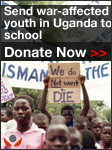All's Quiet on the Gulu Front
We teamed up to try to achieve some mutual objectives, including a visit to an IDP camp (internally displaced persons camp). I visited one when I first arrived to Gulu, but the experience was largely cosmetic and I wish to see the true conditions of the camps. It is estimated that an astounding 90% of the population in Northern Uganda have been displaced by the war. The Ugandan government initiated the camps, called “protected areas”, in its efforts to fight the LRA. While the government claims that they wanted people to leave their land, where they were self-sufficient, and gather in cramped camps without proper sanitation and other provisions so that they could better protect them from abductions and LRA incursions, the IDP camps have had the reverse effect. Thousands of people, mostly women and children, continued to be abducted from the camps during LRA efforts to strengthen their ranks and raid the camps’ food and resources. The camps situate the civilians in between the government army and the LRA rebels, essentially positioning civilians as human shields to both sides. There is also a conspiracy theory among some that the IDP camp campaign was really aimed at the government’s desire to confiscate Acholi lands, perhaps for oil (there is oil in Northern Uganda, but has yet to be fully explored). The bigger conspiracy theory is that the United States is funding the Ugandan government’s war in order to get its hands on more non-OPEC, non-Middle Eastern oil (the reason also given for the US supporting Southern Sudanese rebels, as their lands are oil-rich). While I recognize that the US government of course has its interests, and is indeed providing support to the Ugandan government, I think it is ridiculous to use the US as a scapegoat for the entire 18-year conflict. There is a lot of finger pointing, but nobody seems to want to take responsibility for their own roles.
So Stefan and I went on a wild goose chase on boda bodas from the Camp Commanders to the United Nations Office for the Coordination of Humanitarian Affairs (UN-OCHA) and then to the World Food Program (WFP). We were told that we would be allowed to accompany the armed WFP convoy to Opit Camp, east of Gulu town. We wrote our little letters by hand and called up the local army to secure our clearance. It seemed to be too easy, and of course it was, because I got a call about a half hour before we were to depart telling us that the head of the WFP was refusing out request. We later found out that our rejection was primarily attributed to security concerns, as the camp we wanted to visit is in a fairly insecure region (though we would be in an armed convoy of the United Nations and the Ugandan army). Another possible dynamic of this rejection is corruption within the WFP, in which some food is distributed, but portions are taken back to Kampala and re-sold to WFP again. So naturally people wouldn’t want random mzungus to bear witness to this (note: this is just a rumor and I am not sure of its credibility). Another chance to visit a camp landed on my lap Friday afternoon and I went for it. We returned to the camp I first visited in Gulu, though this time it was spontaneous and without the hype of Peace Week. So we wandered through Unyama Camp, north of Gulu, for about an hour. We were told that over 20,000 people reside there, excluding the children (so my guess is about 27,000). The camp, and I am assuming due to its proximity to Gulu town, has not been attacked since 2003. We were well received by the camp’s residents and had the opportunity to get a glimpse of daily life: women brewing the local gin (called gulugulu, which smells of anise), men drinking the gulugulu, a young boy’s hut utilized as a convenient store, a woman spreading the cow dung mixture to make the floor of her hut, children playing and doing their various chores. The children, with the Sally Struthers swollen bellies of malnutrition, were so curious and incredibly photogenic. They shouted monu!, the Acholi version of mzungu, and rubbed my arm to see if the white would rub off onto their fingers.
So it was a good experience, but continues to raise so many questions in my mind about this war. The more I dig, the more complicated it all becomes. We had dinner with our contact that escorted us to the camp, along with his first wife (he has two), sister and baby boy. This man worked closely with a renowned Swedish anthropologist who paid him a sum of money intended to finance a house – instead he took the money to get himself another wife. We surfed around talk of religion (Born Agains, Catholicism, Agnosticism), polygamy, and even details of the 2002 Ebola outbreak in Gulu town (yikes!).
Tomorrow I will take a few days to go to Kampala for some interviews. I hope the break from Gulu might also have a therapeutic effect on my health. Next week I might go with Lina to Kitgum, which is a district northeast of Gulu. We are investigating the security and I am pulling for ACORD to pay for us to fly, as I am not sure the bus is worth the risk. The districts of Gulu, Kitgum, and most of all Pader, continue to experience insecurity due to LRA and government troop activity. I think the rhetoric of peace is still a bit premature.



